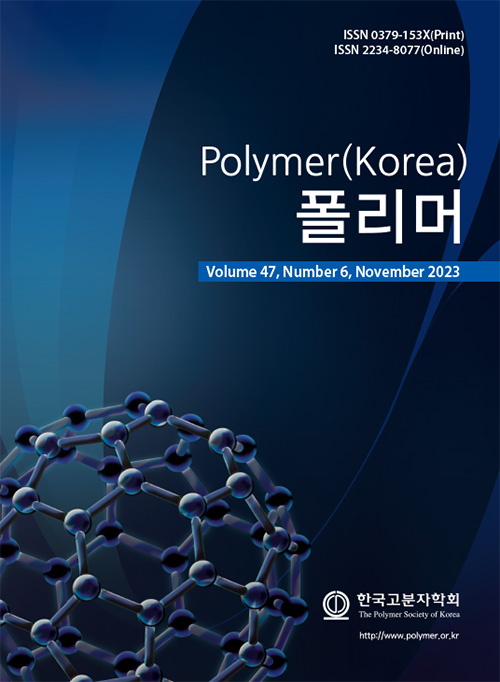- Effect of Lignin Nanoparticle Addition on the Physicochemical Properties of Electrospun Poly(vinyl alcohol) Nanofibers
Junsik Bang*, Seungoh Jung*, Heecheol Yun*, Hyoung-Joon Jin**, ***, and Hyo Won Kwak*, ****,†

*Department of Agriculture, Forestry and Bioresources, Seoul National University, 1 Gwanak-ro, Gwanak-gu, Seoul 08826, Korea
**Program in Environmental and Polymer Engineering, Inha University, Incheon 22212, Korea
***Department of Polymer Science and Engineering, Inha University, Incheon 22212, Korea
****Research Institute of Agriculture and Life Sciences, Seoul National University, 1 Gwanak-ro, Gwanak-gu, Seoul 08826, Korea- 리그닌 나노입자의 첨가가 전기방사된 PVA 나노섬유의 물리화학적 특성에 미치는 영향
*서울대학교 농림생물자원학부, **인하대학교 고분자환경융합공학전공, ***인하대학교 고분자공학과, ****서울대학교 농업생명과학연구원
Reproduction, stored in a retrieval system, or transmitted in any form of any part of this publication is permitted only by written permission from the Polymer Society of Korea.
Among lignocelluloses, a component of wood, lignin is currently in the limelight as a green additive for imparting various functions such as reinforcing the mechanical strength of general-purpose plastics, antioxidation, and UV protection. In this study, lignin nanoparticles (LNPs) with a size of 100-200 nm were prepared using a gamma-valerolactone-based solvent system. The prepared LNPs were added to poly vinyl alcohol (PVA), and PVA nanofibers incorporated into the LNPs were successfully prepared through electrospinning. The tensile strength of the PVA/LNPs nanofibers was improved by up to 338% as LNPs were added, and the morphology of the nanofibers was stably maintained without melting even when heat was applied at 200 ℃, which is above the melting point of the matrix polymer. In addition, the added LNPs effectively prevented the degradation of PVA nanofibers by UV exposure. These results suggest that LNPs can be used as natural polymer additives that can provide effects such as thermal and mechanical stability and photolysis resistance to PVA nanofibers.
목재의 구성 성분인 리그노셀룰로오스 중 리그닌은 최근 범용 플라스틱의 기계적 강도 강화, 항산화, 자외선 차단 등 다양한 기능을 부여하는 친환경 첨가제로 각광받고 있다. 본 연구에서는 감마-발레로락톤 기반 용매 시스템을 이용하여 100-200 nm 크기의 리그닌 나노입자(LNP)를 제조하였다. 준비된 LNP를 폴리비닐알코올(PVA)에 첨가하고, 전기방사를 통해 LNP가 첨가된 PVA 나노섬유를 성공적으로 제조하였다. PVA/LNPs 나노섬유의 인장강도는 LNP가 첨가됨에 따라 최대 328%까지 향상되었으며, 매트릭스 고분자인 PVA의 용융온도보다 높은 200 ℃ 환경에서도 나노섬유의 형태가 안정적으로 유지되었다. 또한, 첨가된 LNP는 자외선 노출에 의한 PVA 나노섬유의 분해를 효과적으로 방지하였다. 이러한 결과는 LNP가 PVA 나노섬유에 열적, 기계적 안정성 및 광분해 저항성과 같은 효과를 제공할 수 있는 천연 고분자 첨가제로서 사용될 수 있음을 시사한다.
Keywords: poly vinyl alcohol, lignin, nanoparticle, nanofiber, gamma-valerolactone.
- Polymer(Korea) 폴리머
- Frequency : Bimonthly(odd)
ISSN 0379-153X(Print)
ISSN 2234-8077(Online)
Abbr. Polym. Korea - 2023 Impact Factor : 0.4
- Indexed in SCIE
 This Article
This Article
-
2023; 47(6): 720-728
Published online Nov 25, 2023
- 10.7317/pk.2023.47.6.720
- Received on Jun 16, 2023
- Revised on Aug 30, 2023
- Accepted on Sep 22, 2023
 Correspondence to
Correspondence to
- Hyo Won Kwak
-
*Department of Agriculture, Forestry and Bioresources, Seoul National University, 1 Gwanak-ro, Gwanak-gu, Seoul 08826, Korea
****Research Institute of Agriculture and Life Sciences, Seoul National University, 1 Gwanak-ro, Gwanak-gu, Seoul 08826, Korea - E-mail: bk0502@snu.ac.kr









 Copyright(c) The Polymer Society of Korea. All right reserved.
Copyright(c) The Polymer Society of Korea. All right reserved.